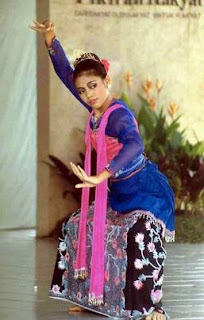Jaipongan is the art of dance that was born from the creativity of an artist from Bandung, gugum Gumbira. He inspired the folk art one of them is making Tap Tilu really know and recognize patterns perbendaharan dance tradition that is at or Kliningan Tilu Bajidoran or Tap. So that he can develop a dance or art that is now known by the name Jaipongan.
Jaipongan work first began to be known by the public is dance "Leaf Bojong Keser plus" and "Rendeng Bojong" both of which type of dance and dance partner's daughter (sons and daughters). Initial appearance of the original dance movement is considered as the erotic and vulgar, but the longer this dance more popular and began to increase both the frequency pertunjukkannya in the medium of television, celebration, and celebrations that disenggelarakan by the government or by private parties.
From this starting Jaipong dance was born a few dancers that are reliable Jaipongan like Tati Saleh, Yeti Mamat, Eli Somali, and Pepen Dedi Kirniadi. The presence of dance Jaipongan contributed considerable to the art of dance lovers for more active types of folk dances explore previously lacking in attention. With the emergence of this Jaipongan dance that many are making dance courses Jaipongan, and frequently used by businessmen to enticing guests.
In Subang Jaipongan style "Kaleran" has a characteristic that is fun, erotic, humorous, spirit, spontaneity, and simplicity. This pattern was reflected in the presentation of dance on the show, there is a given pattern (Pattern Ibing) as in art Jaipongan in Bandung, as well as others who do not dance dipola (Ibing Saka), for example in art Jaipongan Subang and Karawang. This term can we meet the Jaipongan kaleran style, especially in the Subang area.
Dance Jaipongan today could be called as one of the West Javanese dance, look at the important events coming of guests from foreign countries who came to West Java, was always greeted with a performance at Jaipongan dance. Dance Jaipongan influence on many other art-art in West Java, both on the art of wayang performances, gamelan, and other genjring even with dikolaborasikan by Mr Modern Dangdut. Nur and Leni to become art Pong-Dut.
Jaipongan work first began to be known by the public is dance "Leaf Bojong Keser plus" and "Rendeng Bojong" both of which type of dance and dance partner's daughter (sons and daughters). Initial appearance of the original dance movement is considered as the erotic and vulgar, but the longer this dance more popular and began to increase both the frequency pertunjukkannya in the medium of television, celebration, and celebrations that disenggelarakan by the government or by private parties.
From this starting Jaipong dance was born a few dancers that are reliable Jaipongan like Tati Saleh, Yeti Mamat, Eli Somali, and Pepen Dedi Kirniadi. The presence of dance Jaipongan contributed considerable to the art of dance lovers for more active types of folk dances explore previously lacking in attention. With the emergence of this Jaipongan dance that many are making dance courses Jaipongan, and frequently used by businessmen to enticing guests.
In Subang Jaipongan style "Kaleran" has a characteristic that is fun, erotic, humorous, spirit, spontaneity, and simplicity. This pattern was reflected in the presentation of dance on the show, there is a given pattern (Pattern Ibing) as in art Jaipongan in Bandung, as well as others who do not dance dipola (Ibing Saka), for example in art Jaipongan Subang and Karawang. This term can we meet the Jaipongan kaleran style, especially in the Subang area.
Dance Jaipongan today could be called as one of the West Javanese dance, look at the important events coming of guests from foreign countries who came to West Java, was always greeted with a performance at Jaipongan dance. Dance Jaipongan influence on many other art-art in West Java, both on the art of wayang performances, gamelan, and other genjring even with dikolaborasikan by Mr Modern Dangdut. Nur and Leni to become art Pong-Dut.

0 komentar:
Posting Komentar